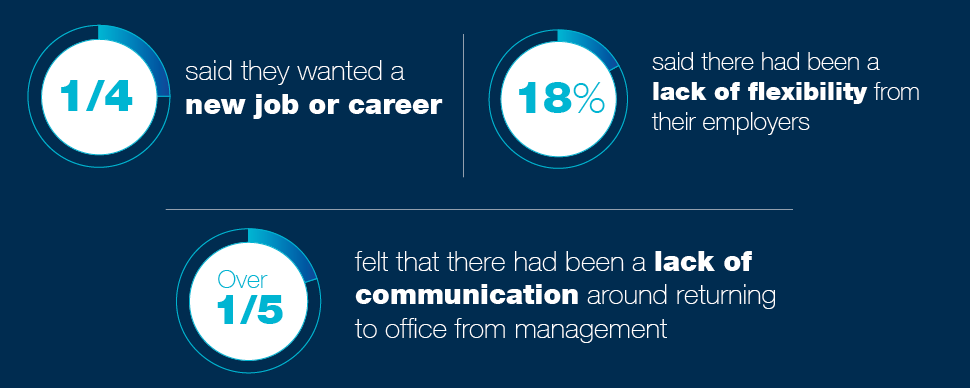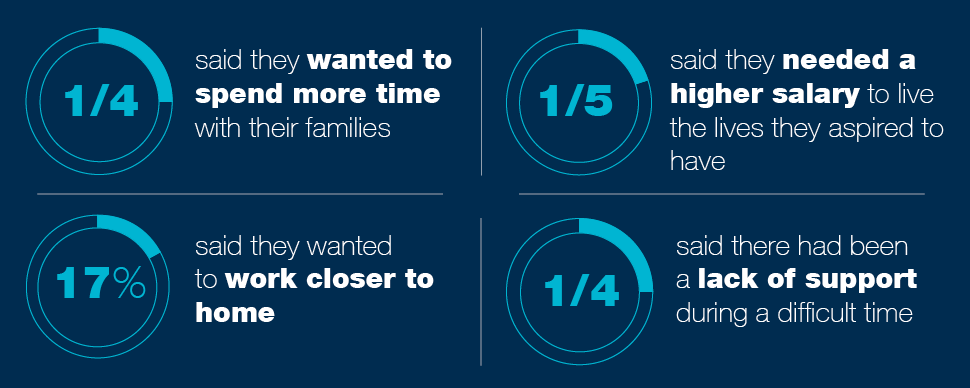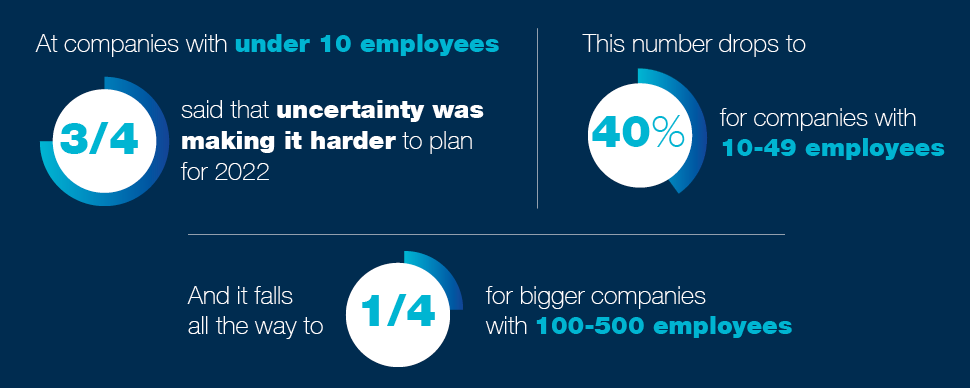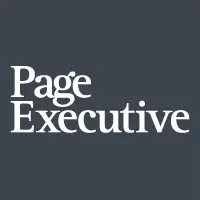Forward planning and hybrid working: Key challenges for business leaders



Since the onset of the Covid-19 pandemic, business leaders across the country have been tasked with steering their companies through exceptional turbulence. This included forward planning both for their operations, and for their people, at a time when huge sections of the economy had shut down without any guaranteed timelines around reopening. But even now that lockdown restrictions have eased and the economy has returned to growth, many are facing a range of challenges relating to people management and forecasting in an uncertain economic environment.
To dig deeper into this topic, Page Executive recently partnered with Censuswide to survey over 1000 business leaders and over 2000 office workers from around the country. Here, we discuss the major challenges business leaders are facing in Q4 of 2021 – and will likely continue to face in 2022.
While the future is not as murky as it was during periods of strict lockdown, there are still many unanswered questions complicating the task of business planning. The post-lockdown economy has enjoyed a steady recovery and the hiring market has picked up dramatically. But with talent shortages causing disruptions across the country, can businesses expect this upswing to continue into 2022?
Against this backdrop, it’s no surprise that many business leaders remain cautious, especially considering that many businesses will still be recovering from the financial damage sustained during repeated lockdowns. This is reflected in the results of our survey: around half of all respondents said that uncertainty is creating challenges around forward planning for 2022.
Within this group, however, there are notable differences between the responses of leaders at larger and smaller companies:

Additionally, one quarter of respondents said that they were uncertain about their business’s future. Again, leaders from smaller businesses were less confident in their organisations’ prospects, with one third of respondents from companies with 1-49 employees answering this way, compared to only 10 percent of those from companies with 200-500 employees.
It’s also worth noting that in such a candidate-driven and skills-short talent market, employers may not be able to rely on a stable and consistent workforce. In our survey of UK office workers who have begun to return to their workplaces, respondents also reported a range of dissatisfactions with their current roles, employers, and situations:

With so much to consider, it’s no wonder that many business leaders are finding it hard to plan effectively for the near future. The economy remains strong and dynamic – but capitalising on this will require organisations to stay ahead of the curve and consistently attract and retain top talent at a time when candidates have their pick of roles.
In our recent Talent Trends eBook, we showed that effective talent attraction and retention in a post-lockdown world hinges on the degree of flexibility employers offer to prospective candidates. When the pandemic hit, workplaces across the UK were forced to transition their entire workforces to remote working. Now, with many workers returning to the office, the bulk of employees are still spending much, most, or all of their working weeks at home. Leadership teams across a range of sectors are now deciding what balance they will strike between office-based and remote working going forward.
Each organisation is having to balance their own operational realities with the demands of their workforces. Of course, in such a candidate-short market, top talent is hard to attract and easy to lose, making it essential that business leaders remain in tune with how their workforces are feeling.
To help leaders with this challenge, we also surveyed over 2000 UK office workers, asking respondents ‘why, if at all, have you thought about leaving your current company since the pandemic began?’. Strikingly, only one quarter had not thought about leaving their company.
Moreover:

Business leaders will need to move fast if they want to retain their best employees, and indeed the results of our survey with UK executives show a major drive to finalise post-lockdown ways of working. One quarter of respondents have settled on hybrid working - a flexible mixture of office and home-based working - as their preferred model. This will have the benefit of enabling workers to enjoy more leisure time and save on commuting costs whilst also reclaiming the benefits of face-to-face contact with co-workers.
On the other hand, one fifth of respondents say they will allow employees to make their own decisions regarding time spent working from home, without any compulsion. This option is clearly geared toward employee satisfaction and may have beneficial effects on talent attraction and retention. Nonetheless, it could also create complications around office space, protocols for coming into office and inconsistent meeting schedules, since patterns of employees coming into office could be unpredictable.
Meanwhile, another fifth will require employees to return to office full time, and a slightly smaller proportion will transition to fully remote working. These extremes both could have their drawbacks. Fully office-based working is a favourable option for only a minority of professionals, while fully remote working could cost organisations the benefits associated with face-to-face working. It should also be noted that while two thirds said they had made up their minds, one half specified that these plans would be subject to change. Business leaders are working hard to finalise their ways of working - but they are having to do so with the potential for further turbulence in mind.
Amid a positive but complex macroeconomic picture, it has never been more important for organisations to be able to attract and keep top talent so they can drive continued success. At Page Executive, our consultants work closely with experienced business leaders to help them take the next step in their careers. To arrange an introductory meeting, click here.
Register to download report

